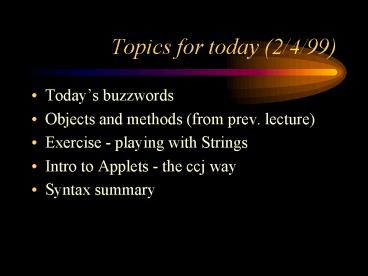Topics for today 2499 - PowerPoint PPT Presentation
1 / 12
Title:
Topics for today 2499
Description:
Assign values to them. Invoke methods on them. Access their data (if allowed) More on objects ... Assigning a value (constructing or instantiating) to a class variable ... – PowerPoint PPT presentation
Number of Views:30
Avg rating:3.0/5.0
Title: Topics for today 2499
1
Topics for today (2/4/99)
- Todays buzzwords
- Objects and methods (from prev. lecture)
- Exercise - playing with Strings
- Intro to Applets - the ccj way
- Syntax summary
2
Todays buzzwords
- Objects and Classes
- Methods
- Abstraction
- Keeping the internals hidden from outside users
- Escape characters
- Special characters that cannot be used otherwise
- Debugging
- Getting rid of those darn bugs!
3
Objects
- Like strings, there are many other types (or
classes) of objects in Java. - These classes can be built-in, or they can be in
libraries that you can use. - With classes, you can
- You can define variables of these class types
- Assign values to them
- Invoke methods on them
- Access their data (if allowed)
4
More on objects
We use a fictitious class Automobile for these
examples.
- Declaring a variable of type a class
- Automobile myCar
- Assigning a value (constructing or instantiating)
to a class variable - myCar new Automobile(Toyota)
- myCar new Automobile(Toyota, 1992)
- Invoking a method on a class variable
- miles myCar.odometerReading()
5
Back in Time()
- Declaring a Time object
- Time flies
- Creating a new Time object
- Time now new Time()
- Time yesterday new Time(1999,2,3,0,0,0)
- Running methods on the Time object
- int hourNow now.getHours()
- int secondElapsed
- now.secondsFrom(yesterday)
6
Why do we use objects?
- Users dont need to worry about how something is
implemented (abstraction) - How does the Time object find out what time it
is? - How does it calculate the number of seconds
between two times? - As long as the methods stay the same, someone can
change object implementations without problems. - Keeps the code clean and easy to understand
7
A little more on String
- What if you want to have a newline inside a
string? - String weird "I really need two lines to write
this long sentence!" - What if you need to place quotes inside a string?
- String talk
- "I said "hello" to him." / right? /
- Answer Escape characters
- Characters with a backslash ( \ )in front of them
8
Special Characters
- The following can be used in a string
- \n newline
- \t tab
- \" a double quote inside a string
- \\ the backslash itself
- "to type a long string without using another\
- string, use a \\ before the new line
9
Class exercise
- Given a one word name written in any way,
generate the name in a proper way. - e.g., generate "Shakespeare"
- for all the following inputs
- Shakespeare
- shakespeare
- sHAkeSPeaRE
- SHAKESPEARE
10
Debugging programs
- Using a debugger
- system dependent
- often confusing and takes time to learn
- Staring at the program
- you may need to stare quite long!
- Using temporary printlns
- If you suspect a problem somewhere, put a println
before that to see if it comes out okay.
11
Other debugging techniques
- Trying out the program using constants instead of
variables - Commenting out problem areas
- Writing the program in stages that you know works
- Trying a different approach
12
Syntax summary
- Creating new objects
- myCar new Automobile("Toyota")
- Running methods on objects
- myEff myCar.fuelEfficiency()
- Escaping special characters
- \n \t \ \\
- \ followed by end of line, continued in next line































